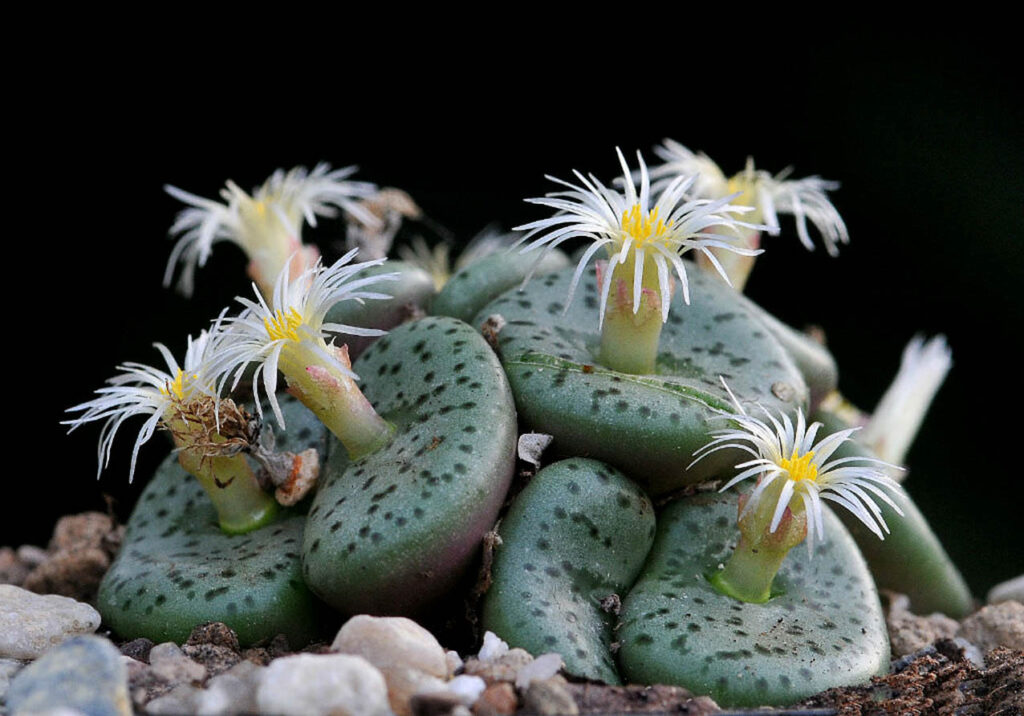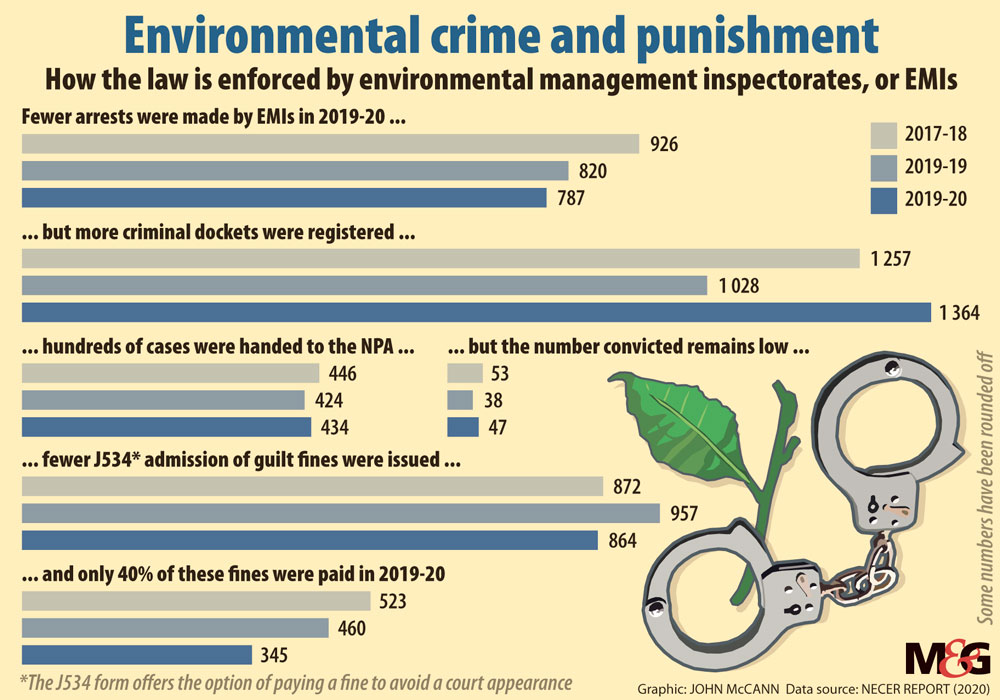The Green Scorpions continue to focus on high risk species such as rhinos, elephants, pangolins and cycads “while still ensuring other species receive protection from the inspectorate”.
Byungsu Kim and Young Il Sunwoo arrived in South Africa with a plan: to find and collect the oldest, largest and rarest plants they could lay their hands on.
Just as they were about to make off with thousands of endemic conophytum succulents they had poached — using a receipt from a nursery in the Western Cape to get an export permit — police and Cape Nature officials pounced on the South Korean smugglers.
 Conophytum succulent
Conophytum succulent
The case is one of several successful prosecutions of environmental offences by the Green Scorpions highlighted in the 2019-2020 National Environmental Compliance and Enforcement Report.
For their role in the illicit trade in the dumpling-like succulents found in the Karoo and up the southwest coast, which are prized by Asian collectors, Kim and Sunwoo were given a suspended sentence of six years and fined R2.5-million each. Sunwoo was deported to South Korea. Kim, who had a nursery in California, was extradited to Los Angeles and faces trial in December.
He was arrested on an Interpol warrant for attempting to illegally export more than $600 000 worth of succulents that he had pulled out of the ground at remote state parks in northern California.
The compliance report details three other recent succulent theft prosecutions in the Western Cape, involving protected species, to feed the illegal international trade.
Crime trends continue
The Green Scorpions continue to focus on high risk species such as rhinos, elephants, pangolins and cycads “while still ensuring other species receive protection from the inspectorate”.
Countrywide, the same trends in environmental crimes persist. Illegal hunting and illegal entry into protected areas are the predominant crimes in the green category (biodiversity and protected areas), with KwaZulu-Natal recording, at 395, the highest reported number of incidents.
 A pangolin skin is displayed amongst other exotic and illegal animal parts at a stall on February 17, 2016 in Mong La, Myanmar. (Photo by Taylor Weidman/Getty Images)
A pangolin skin is displayed amongst other exotic and illegal animal parts at a stall on February 17, 2016 in Mong La, Myanmar. (Photo by Taylor Weidman/Getty Images)
In the brown category (pollution, waste, environmental impact assessment), illegal assessments is the main crime being detected. Gauteng, for example, recorded 168 incidents, behind KwaZulu-Natal at 236.
The Green Scorpions have a growing force to fight these crimes. Their numbers have climbed to 3 240, up from 2 675 in 2018-2019. In addition, in municipalities, there are now 421 designated environmental management inspectors, an increase from 382 in the same period.
 (John McCann/M&G)
(John McCann/M&G)
The National Prosecuting Authority recorded 883 criminal trials in which a verdict was handed down in cases involving waste and pollution, protected species and the marine and coastal environment (blue category, integrated coastal management).
Of these verdicts, 857 were finalised through convictions and 26 resulted in acquittals, translating into a 97.1% conviction rate.
Several fishing trawlers that ventured into marine protected areas were charged, according to the report. At the same time, successes of Interpol-led operations such as Operation Blizzard and Operation Thunderball netted successful seizures and arrests in the illicit reptile, rhino horn and cycad trade.
Eskom and Sasol
The number of facilities inspected rose to 5 445 in 2019-2020 from 4 530 in 2019-2018, with more than half in the waste and pollution sector.
Proactive inspections conducted increased to 4 595 from 2 574. Reactive inspections rose by 29%.
Eskom’s Kendal power station in Mpumalanga was red-flagged for exceeding emission limits and for poor maintenance of its pollution control equipment. It has been ordered to include timeframes in its plan to address this.
At the Lethabo power station in the Free State, noncompliances included the excess of hazardous particles in air (particulate matter), ash spillages that cause dust fallout and groundwater contamination from unlined wastewater dams.
“An enforcement response was initiated in May 2020, which allowed the facility to make representations to the allegations of wrongdoing.
“A compliance notice was issued to the Camden [power station] in August 2018 but by July last year limited or no progress was made. A decision was made to compel Eskom to implement the actions within certain timeframes.”
A compliance notice with timeframes was issued to Tutuka power station in Mpumalanga in May to rectify, among other contraventions, emissions exceeding the limits and breaches of water licences, which cause ground and surface-water pollution.
At Duvha power station, also in Mpumalanga, noncompliances and contraventions included groundwater contamination and excessive dust and particulate matter emissions. The facility has also failed to provide additional information requested by the Green Scorpions.
An enforcement response was initiated against Sasol’s Secunda refinery for groundwater pollution, emissions exceeding relaxed limits and waste pollution, among other contraventions. An extension was granted under Covid-19 for it to submit representations.
The report says there will be a concerted effort by the Green Scorpions to increase compliance and enforcement activities in areas of poor air quality, with a specific focus on declared priority areas.
Covid and the environment
Fewer rhinos were poached countrywide this year under the lockdown, says Ishaam Abader, the deputy director general of regulatory compliance and sector monitoring at the department of environment, forestry and fisheries.
But inspectors have noticed a marked increase in certain types of environmental offences this year.
“In the Eastern Cape, there has been a steep incline in the number of illegal dog-hunting activities as well as the mass invasions of protected forests.
“Limpopo has seen a rise in illegal activities relating to a range of wildlife species as well as elevated levels of deforestation.
“The Western Cape has formed multidisciplinary task teams to respond to the increase in the volume of healthcare risk waste resulting from the response to Covid-19,” according to the report.